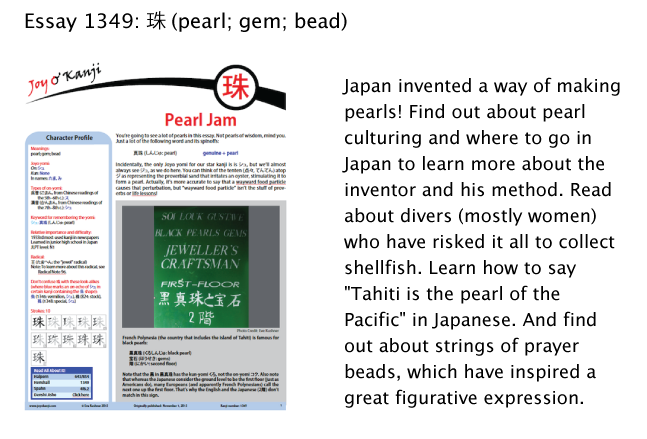To Lead by the Nose
Lately I've been spending a lot of time with 玉. It was the primary focus of Radical Note 96 on the "jewel" radical, 玉 and 王. Also, the 玉 kanji also played a significant role in essay 1349 on 珠 (pearl; gem; bead), just out today. That's because 珠 has the kun-yomi of たま, just as 玉, 球, and 弾 do, though for 珠 it's a non-Joyo yomi. Actually, there are yet two more Joyo kanji with that kun-yomi—魂 and 霊—but those involve matters of the soul. By contrast, the other four たまs concern round things, from pearls and beads (both 珠) to spherical objects such as globes, lumps of noodles, eggs, and lenses (all 玉) to soccer balls (球) to bullets (弾). As such, the various types of たま called for differentiation in the essay.
For all these investigations into 玉, I still wasn't prepared to understand it in this sentence, which a proofreader wrote in an email after reading one of my JOK Notebook posts:
あなたに最初から手玉に取られました。
From the very beginning, you led me by the nose.
最初 (さいしょ: beginning); 手玉に取る (てだまにとる: to lead someone around by the nose)
My difficulty lay with the funny English expression "to lead someone around by the nose." I don't think I'd ever heard it, and I had no idea what it meant.
I asked him whether, etymologically, 手玉に取る has something to do with horses.
No, he said. It has to do with child's play!
If you look at the pictures on one site, you'll see small cloth beanbags known as お手玉 (おてだま). Many Japanese girls love to play a game that involves juggling up to five of these beanbags while singing a song. (Wow, I would not have qualified to be a Japanese kid. I've never been anywhere near that coordinated!)
These beanbags have given rise to the expression 手玉に取る, he said, pointing me to the etymology site Gogen, which provides these definitions:
手玉に取るとは、人を自分の思い通りに動かすこと。翻弄する。手玉にとる。
I see several words that are straightforward enough:
人* (ひと: person); 自分* (じぶん: oneself); 思い通り (おもいどおり: as one likes; to one's satisfaction); 動かす (うごかす: to manipulate)
But the next part is the one that makes things click into place:
翻弄 (ほんろう: trifling with; toying with; playing with; making sport of; making fun of; leading around by the nose)
Aside from the last definition of 翻弄, which sends me in circles, the other meanings clearly impart the flavor and intent of the expression.
Yes, I'm busted. I was wholeheartedly toying with readers. The world is my oyster. (I'm back to pearls!) I'm the grand puppet master!
But, you're wondering, what does this have to do with beanbags? Patience! I'm the one who apparently calls the shots!
Gogen goes on to say this:
手玉は小さな布袋に小豆などを入れたもので、女の子が遊びに使ったお手玉のこと。
曲芸師が手玉を自由自在に扱ったところから、手玉を投げてもてあそぶように、人を自分の思うままに操る意味となった。
Before I go any further, let me say that I had to type all this text from Gogen because their site is copyright-protected, which prevents copying and pasting. And although I thought it would be a drag to reproduce this text, I actually had a ball. (More balls!) What a great exercise! I highly recommend it. Try copying some other Gogen page. We can all violate the copyright together!
Returning to the text that I just typed, I'll provide my proofreader's translation (along with one more instance of お手玉 in the second clause because he says this makes it easier to translate):
手玉は小さな布袋に小豆などを入れたもので、女の子がお手玉遊びに使ったお手玉のこと。
A tedama is a beanbag, a cloth bag filled with small beans. Girls use them in the beanbag juggling game Otedama Asobi.
小さな (ちいさな: small); 布袋 (ぬのぶくろ: cloth bag); 小豆 (あずき: azuki beans); 入れる (いれる: to insert); 女の子 (おんなのこ: girls); 遊び (あそび: playing); 使う (つかう: to use)
Mmm-hmm. So far, I haven't learned anything new. Maybe there's hope in the final sentence:
曲芸師が手玉を自由自在に扱ったところから、手玉を投げてもてあそぶように、人を自分の思うままに操る意味となった。
The meaning of お手玉 comes from a juggler’s trick of handling tedamas (i.e., small beanbags) freely. It has come to mean "manipulating someone the way one wants as if one were juggling and playing with tedamas."
曲芸師 (きょくげいし: acrobat, juggler); 自由自在 (じゆうじざい: free, unrestricted); 扱う (あつかう: to handle); 投げる (なげる: to throw); もてあそぶ (to play with); 思う (おもう: to think); 操る (あやつる: (1) to manipulate; operate; handle; operate (e.g., a machine); steer (a ship); (2) have a good command of (a language); be fluent in; (3) operate a puppet; pull the puppet strings; (4) mastermind; control from the shadows); 意味 (いみ: meaning)
If it seems that I included ten times as many definitions for 操る as needed, it's because I relish the sound of each one. Oh, how I long for all of those things (except perhaps for steering a ship because the liability is too high). And as with 翻弄, this 操る appears to be the keyword.
Now I understand the etymology!
As long as I have total mind control here, I'd like to show you something cool I learned in essay 1349 on 珠. It popped up in a sentence featuring 真珠 (しんじゅ: pearl):
妻を元気付けようとして、トムは美しい真珠のネックレスを買ってやった。
To cheer up his wife, Tom bought her a beautiful pearl necklace.
妻 (つま: wife); 元気付ける (げんきづける: to cheer up); 美しい (うつくしい: beautiful); 買う (かう: to buy)
I love 元気付ける (げんきづける: to cheer up)! And I'm fascinated by how many objects you can "attach" things to in Japanese—even a mood! (Well, Halpern says this 付 means "become," but "attach" must certainly be there in the background.)
I hope all my mental manipulation has cheered you up if that's what you needed. And if you do indeed feel better, it's because I was in the shadows, covertly sending you this message: "Cheer up! Cheer up! You will love kanji, and it will make your world a happier place. Now buy my essay on pearls!"
Did the message come through clearly? Perhaps this preview will tempt you further:

Have a great weekend!

Comments